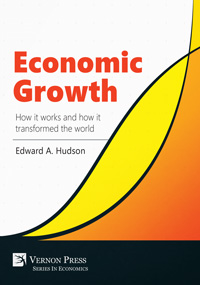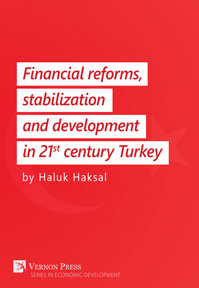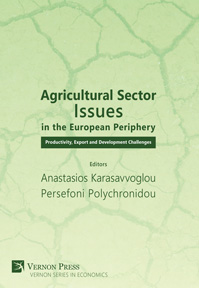Global Economy in Transition: the European Union and Beyond
Linda Winkler, Harold Codrington (Eds.)
by Linda Winkler (Wilkes University), Harold Codrington (Central Bank of Barbados), Anna Krajewska (The Warsaw University of Technology, Poland), Walentyna Kwiatkowska (University of Lodz, Poland), Stanislaw Rudolf (WSB University in Gdańsk, Poland), George Morgan (Virginia Tech), Miron Wolnicki (Villanova University), Ewa Bojar (Lublin University of Technology, Poland), Fyodor Kushnirsky (Temple University), James West (Moravian College 1200 Main Street Bethlehem, PA 18018), Cristanna Cook (Husson University), Jakub Bis , Svitlana V. Maksymenko , Andrij Razhyk , Katarzyna Skorupinska , Mark Thorum
Purchase this book
(click here to change currency)
"This book covers a plethora of economic problems in a context of a changing and challenging global environment. Probably the most distinguishing feature of this collection of essays is the multidimensional perspective it offers on economic development from low, middle, and high-income countries perspective. Not bound by one approach or economic ax, it reveals how different countries and their groups react and deal with the “new normal” of XXI century, including the member states of the European Union, Ukraine, selected countries in Africa, the South Pacific, the Caribbean, as well as India, Japan and the United States. Touching a wide cross-section of topical issues it provides a strong descriptive input in the global transition and transformation debate. In this selection of contributions by both academics and practitioners, one may find studies based on empirical field evidence, comparative analysis of the literature, but also some theoretical framework. Why do monetary policies fail in developed markets? Did globalization overturn social contract? Which models of regulatory regimes for transnational organizations? How the size of the economy contributes to its performance? How to adjust labor market and tax regulations in different regions? Why grass-root policies are important and what makes them efficient? In seeking answers to these and many other questions this book makes an important scholarly contribution to international economics in its breadth and cross-national analyses. As a whole, these contributions provide an overview of many current issues in economics and draw on some crucial problems of the North and the South."
Dr. Katarzyna Andrzejczak,
Poznan Economic University, Poland
This volume covers various issues in global development and global economic transformation including factors affecting economies and development in the European Union (EU), the Ukraine, select countries in Africa, the Caribbean, the South Pacific as well as India and the United States. The global economy is in transition, from the 1990s' status quo to the “new normal” with heavy reliance on the internet, rapid communications, sophisticated payment systems, diminishing importance of size and distance and changing notions of the market.
This volume discusses how this process is affecting economies across the globe and why an appreciation of it will help efforts by governmental bodies and the private sector to reassess societal relationships - both economic and political. This volume shows that challenges to policy-making and the achievement of social consensus on development issues are often quite similar in all countries, irrespective of size, geographical location, endowment and developmental status. The chapters speak to concerns that touch on a cross-section of issues which are driving transition and transformation at multiple levels. As a group, they compare economic factors across transnational economic or political associations (OECD, European Union, G20) or make comparisons across or within emerging markets or small states (BRICS, various African countries, the Caribbean, South Pacific). They include the presentation of a new model for transnational agreements, discussions of policies related to labor compensation and corporate governance, comparisons of nations across the world using indices of economic development and governance, an analysis of gender inequality in employment in the European Union, comparisons of tax burdens across the European Union and the USA, discussions of employee representation in corporate governance, and a look at grass-roots development and markets in developing economies. As a whole, in its breadth and cross-national perspective, the volume represents an important scholarly contribution to international economics.
Biographies of Contributors
Acronyms within this volume
Acknowledgements
Chapter 1 Introduction
Linda A. Winkler and Harold Codrington (Editors)
Chapter 2 Does Size Matter in Economic Development?
Harold Codrington
Chapter 3 A Comparison of the Tax Burden on Labor in Poland and the United States
Anna Krajewska
Chapter 4 Women and Men in the Labor Market in Poland and Other EU Countries
Walentyna Kwiatkowska
Chapter 5 The Efficiency of Employee Representation in Corporate Governance in the Selected EU Countries
Stanisław Rudolf
Chapter 6 The Role and Position of Works Councils in the Polish System of Labor Relations
Stanisław Rudolf and Katarzyna Skorupińska
Chapter 7 Determinants of Transnational Regulatory Regimes
George Morgan and Mark Thorum
Chapter 8 The Death of the Social Contract and the Misery of XXI Century Interventionism
Miron Wolnicki
Chapter 9 Ukraine in a Transformation Period: An Assessment of Ukraine’s Investment Climate by Foreign Direct Investors
Ewa Bojar, Andrij Razhyk, and Jakub Bis
Chapter 10 Regional Growth and Poverty in Ukraine
Fyodor I. Kushnirsky and Svitlana V. Maksymenko
Chapter 11 TCB in India’s New ICE Age: Lessons for BRICS
James P. West
Chapter 12 Western Marketing and Economic Principles in the South Pacific and the Decline of Communal Values
Cristanna M. Cook
Chapter 13 Barbados at 50: Lessons for Other Small Developing Countries
Harold Codrington
Chapter 14 Grass-Roots Initiatives Driving Economic Development in Rural Tanzania
Linda Winkler
Index
Linda Winkler is currently Professor of Anthropology at Wilkes University. She earned her PhD in Anthropology from the University of Pittsburgh. Her research interests include global development, international education, global health, and developing broader global partnerships. She has been involved in ongoing international projects in Central America, Africa, and Asia. She received the Chancellor’s Outstanding Teaching Award at the University of Pittsburgh (2005), an Incubator Award from the Savings Lives at Birth USAID/ Gates Foundation for her research and partners in Tanzania and awards from Wilkes University, Midland University and Rotary International for her work in promoting diversity, her international development projects, and career successes. She has published numerous articles and three edited volumes as well as serving as editor for journals on a variety of topics including global development, international education, global health, and anthropology. She has previously served as co-editor for a conference book for the Congress of Political Economists. One of her favorite endeavours has been developing children’s books in Kiswahili for use in East Africa. She is active in professional organizations including as a Board Member for COPE, in the American Anthropological Association and Sigma Xi. She serves as a reviewer for several journals, publishers and grant organizations.
Harold Codrington obtained his Master’s Degree in Economics from York University, Toronto in 1979. He joined the Central Bank of Barbados in 1979, and held the position of Deputy Governor from 2011 to 2016. From 1989 to 1990, he was seconded to the International Monetary Fund as Technical Assistant to the Executive Director for Barbados, Canada, Ireland and the English-speaking Caribbean. During the summer of 1993, he was a Fulbright Scholar at George Washington University in Washington D.C. He has published papers on the Balance of Payments, Public Transport, Taxation, Monetary Union and Social Partnerships. He was the Editor of the Newsletter of the Barbados Economics Society from 1998 to 2012.
Global Development, Human Development Index, European Union, Ukraine, Grass-Roots Development, Barbados, Sub-Saharan Africa Development, Tanzania, India, South Pacific _ EU corporate governance , female employment rate, Poland, MIFID, transnational regulation, Tax wedge, OECD, G-20, investment climate, corruption, foreign direct investments, FDI Ukraine agricultural growth, Ukraine regional economy, econometric model, GRP, Ukraine production sectors, BRICS, India free enterprise, India ICE, India black economy, colonialism, NGOs, substantive versus formalist economics
Subjects
Economics
Political Science and International Relations
Series
Vernon Series in Economics
Related services
Find in a library near you Download HQ cover Find in Bookshop.orgSee also
Bibliographic Information
Book Title
Global Economy in Transition: the European Union and Beyond
ISBN
978-1-62273-336-1
Edition
1st
Number of pages
260
Physical size
236mmx160mm

![Global Economy in Transition: the European Union and Beyond [Paperback]](/file/4809/429f80dedf1683071b2e03cbe1ae1a9e/1507554578.jpg)





